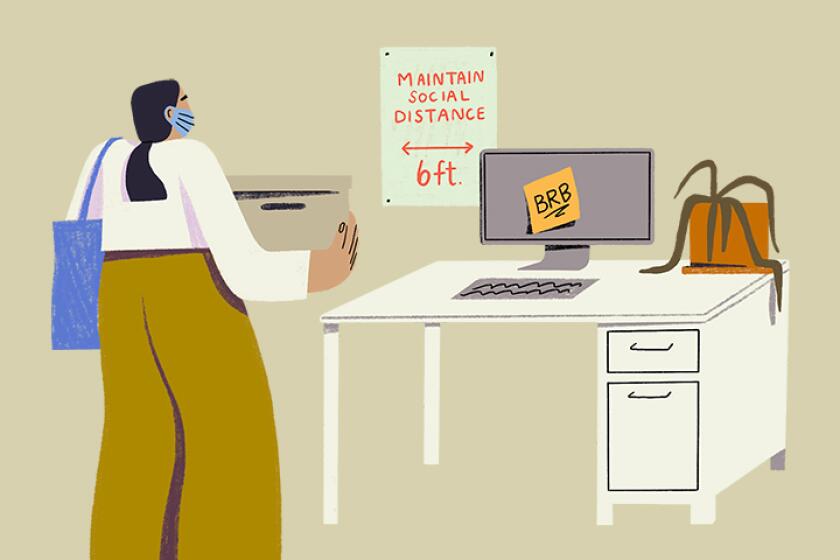For a quick buck, try babysitting. It’s not for low-paid teens anymore

Looking to earn a fast buck? Consider babysitting.
An increasing number of companies are reopening offices and asking employees to show up in person at least part of the time. That leaves parents desperate for child care. After all, many schools are still not fully open. Plus, summer vacation is only weeks away, and some parents are justifiably concerned about sending kids to camp as they might have done in pre-pandemic summers.
Some of us are hoping that a year of remote work will lead to greater job flexibility. Others can’t wait to get out of the house.
That spells opportunity for people who are willing and able to babysit. Unlike the job you may remember from youth, babysitting is no longer poorly paid and done mainly by teens. Many of today’s babysitters are background-checked adults who earn well above minimum wage. The average sitter’s wage nationwide is $16, according to Sittercity. However, rates are higher in big cities such as Los Angeles and New York, where sitters typically earn $20 to $22 per hour before tips.
Aside from patience and a clean criminal record, there are few job requirements. In many cases, you don’t even need a car. However, those who have CPR training, experience with infants, or the ability to transport children to and from school and activities typically earn premium rates.
Another nice aspect of babysitting: You often get paid within hours of completing the job. That makes it a nice choice for people who want to earn a fast buck.
A plethora of online platforms make babysitting work easier to find. Here are some of the best options.
Babysitting and nanny services
Sittercity connects sitters and nannies with families that need their help. The site charges parents, not sitters, for the matchmaking service, so there’s no downside to signing up as a worker. Sitters set their own rates. The site helps you gauge whether your rates are competitive by providing data on average rates paid in various cities.
UrbanSitter also invites sitters to post a profile, set their rates and advertise their child-care services. Babysitters and nannies pay a fee of $35 annually, which includes a background check. Parents also pay a membership fee. Sitters’ reviews of this site are overwhelmingly positive; however, some have complained about getting booted for what they believe were minor infractions. Given that parents pay for the service because they imagine they’ll get better-quality help, UrbanSitter has every incentive to be cautious.
If you’re a high school student looking for work, Bambino is one of just a handful of sites that are open to sitters who are younger than 18. It connects parents and sitters via social media, aiming to create a trusted community.
A slew of delivery, baby-sitting, retail and evaluation jobs, among others, can be done without specialized training or previous experience.
Transporting minors
Those who have child-care experience and a car can potentially earn more by signing up with any of three sites that connect you with work driving young kids to and from school and after-school events. For these jobs, you’ll need to pass both background and driver screenings.
Zum works with students and parents in half a dozen states, including California, to arrange transportation for minors. Usually, this involves picking kids up from school and bringing them home or to after-school activities. Drivers are sometimes asked to provide a few hours of care. Freelancers see the nature of the job and the pay before accepting. Hourly rates generally range from $15 to $35 per hour.
HopSkipDrive and Kango also connect freelancers with parents who need rides for their minor children. These sites have a slightly smaller geographic range than Zum but are otherwise comparable in terms of pay and requirements.
Launching a daycare center
If you want to make caring for children into a career, a company called Wonderschool can help you set up and manage your own daycare business. The site will help lead you through the necessary licensing, certification, administration and marketing. Then, it will manage your tuition collection and scheduling in exchange for 10% of the monthly revenue.
Extras don’t get film credits or lines. But they can get union wages, meals and perks — such as getting to read novels or work on their side gigs while on the job.
Kristof is the editor of SideHusl.com, an independent site that reviews hundreds of money-making opportunities in the gig economy.
More to Read
Inside the business of entertainment
The Wide Shot brings you news, analysis and insights on everything from streaming wars to production — and what it all means for the future.
You may occasionally receive promotional content from the Los Angeles Times.













